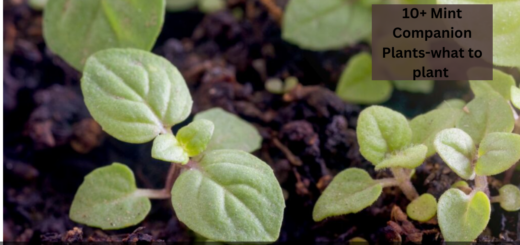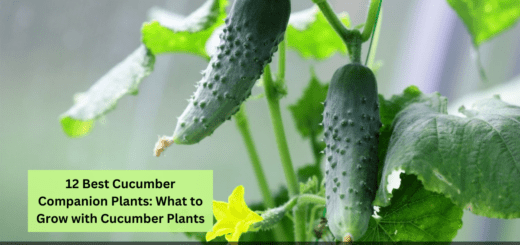15 Companion Plants for Peppers (& What not to plant with them?)
Wouldn’t it be great to know you can grow pepper with other plants without affecting the health of the mint? In fact, it can even help the pepper thrive. Isn’t this interesting? Want to know which plants work well with pepper? Hold on, you’ll find out everything.
Don’t worry if you don’t know which companion plants grow best with pepper and complement each other because you’ve come to the right place. Here, you’ll get all your answers.
In this article, I’ve explained all my experiments that I conducted, which will help you decide which plants should grow with pepper and which should not. Let’s dive in and start growing mint plants together.
Key takeaways:
- To plant the varieties and grow the plants healthy and help the neighboring plants in so many ways like repelling the pests, keeping diseases away, making the soil fertile, bringing beneficial predators, and pollinators in the garden, enhancing the taste, regulating the growth of plants, etc.
- Companion planting is the process of planting two more plants together to mutually benefit each other or simply benefit another plant without getting harmed by that plant.
Let’s get to know what to plant near the pepper plants and what not to plant near the pepper plants.
Good companion plants for peppers
Garlic
The pungent smell of garlic plants makes it a good companion for pepper plants. The strong smell of these keeps the spider mites, aphids, maggots, and other pests away from the pepper plants. The garlic plants near the affinity of the pepper plants also deter the beetles and harmful flies from the garden. The garlic plant doesn’t let the fungal infections come near the pepper plants. Just not this, garlic adds another advantage to the pepper plants like keeping the soil away from mold and agents causing verticillium wilt, blight, etc.
Cilantro Basil Parsley Thyme
The herbs are good companion plants to many vegetables, peppers are one of them.
Cilantro
Cilantro is a herb that helps the peppers via their scent. The strong fragrance of the cilantro keeps the pests away, especially the aphids and attracts the pollinators like bees, and insects that feed on these tiny pests as well.
Parsley
Parsley keeps spider mites, aphids, earworms, and beetles that usually attack the pepper plants and ruin the peppers. The beneficial insects are attracted to the garden having parsley growing there.
Basil
The strong smell of basil doesn’t let the thrips come near the pepper plants. The basil plants also improve the flavor of peppers.
Thyme
Thyme repels pests and attracts useful pollinators leading to an increase in the yield of fruits.
Cucumbers
Cucumbers are great companions of pepper plants. The plants both have almost similar growing conditions. No extra demands. The plant grows with cucumbers happily with support and above without interfering with peppers.
Tomato
Just like cucumbers tomatoes also grow in the same conditions like that as peppers. The gardener doesn’t have to work extra hours for the other plant. The taste of tomatoes also improves in the presence of pepper plants
Eggplant
The eggplant and pepper plants have similar growing needs and similar nutrient requirements. The same fertilizer is supposed to be provided to the spot where eggplant and pepper plants are growing together. The pepper plants provide benefits to eggplants by keeping fusarium issues away from them.
Sunflower
The sunflowers are just not beautiful looking but also are good companions of pepper plants. The sunflowers provide a good partial shade to peppers which can get too dry due to too much heat. Sunflowers also keep the aphids at bay growing near the pepper plants.
Nasturtium
The beautiful flowers of nasturtium plants invite a lot of pollinators into the garden which will help increase the yield. The plants also help peppers by deterring the peats like aphids, etc, and keeping the pepper plants all safe. The nasturtium leaves are loved by aphids so they prefer to eat them than ruin the peppers that will enter your dishes.
Okra
The okra growing near the pepper plants is a great windbreak to the delicate stems and the pest stays far away from the pepper plants when okra is there. Pepper on the other hand repels the cabbage worms from okra leaves.
Asparagus
Smart use of the garden space includes planting asparagus and pepper plants together. The plants both have different maturing times in which asparagus needs to be harvested early and pepper will be later. They don’t interfere in each other’s space.
Spinach
Spinach is a good companion to pepper plants as the weeds don’t get the space to grow because the spinach is already growing there. The small plants stay below the pepper plants and help in keeping the soil moist which can get dry to sun heat. They also harvest earlier than the pepper plants.
Carrots
Carrots need partial shade which the pepper plants provide, whereas the carrots help the pepper by reducing the weeds near the plants and acting as the natural mulch for the pepper plants.
Onions
The onions help the pepper plants a lot. They keep the insects and pests away from the pepper plants. The onions also repel the cabbage worms that also love to eat the pepper plants. The onion not only does this but also doesn’t compete with the pepper plants for space and much nutrients.
Chives
The chives are great companions of the pepper plants that not only enhance the flavor of the vegetable but also keep the aphids, slugs, and worms away from the pepper pants.
Lettuce
Lettuce plants are perfect to grow near the pepper plants to utilize the garden space properly. The plants can be grown without worrying about special care as they both grow in similar growing conditions. The pepper plants provide shade to the lettuce plant which they need.
Bad companion plants of a pepper plant
Potatoes, apricots, and brassicas like kale, broccoli, cabbage, cauliflowers, collards, kohlrabi, and fennel are the plants that should not be planted near the pepper plants. The pepper plants are highly affected by these plants growing near them. Like brassicas have different growing needs like soil type, and water needs, which can make them compete with the pepper plants for nutrients and water.
The fennel is seen to stunt the growth of pepper plants and attracts pepper-eating insects and pollinators like aphids, ants, and swallow butterflies whose caterpillars can eat the pepper plants. The apricot and the pepper plants have common problems like fungal diseases, etc. The potatoes and pepper plants are bad companions because the potatoes attract pests and insects that attack the pepper plants.
Wrapping up the context
Knowing the good and bad companions for a plant that you are about to grow is really important in keeping the plant healthy and growing properly. The pepper plants though can thrive well with proper care but what’s best is that the care is provided by the other plants which also should be included in your garden for decorating, vegetables, or even fruits. We hope you find this article informative in understanding the benefits and harm that some plants can cause to pepper plants in your garden. We are happy to help. Enjoy companion planting!


